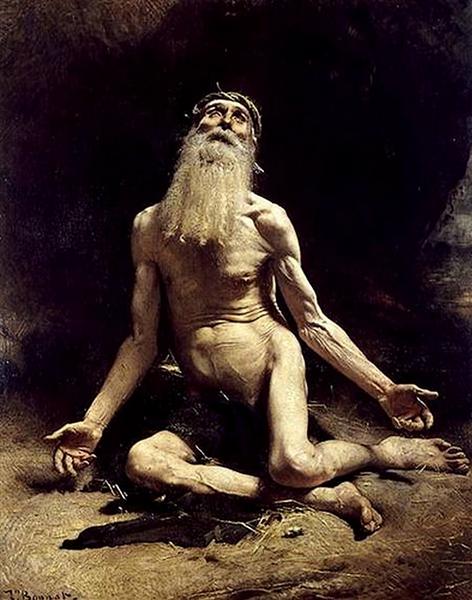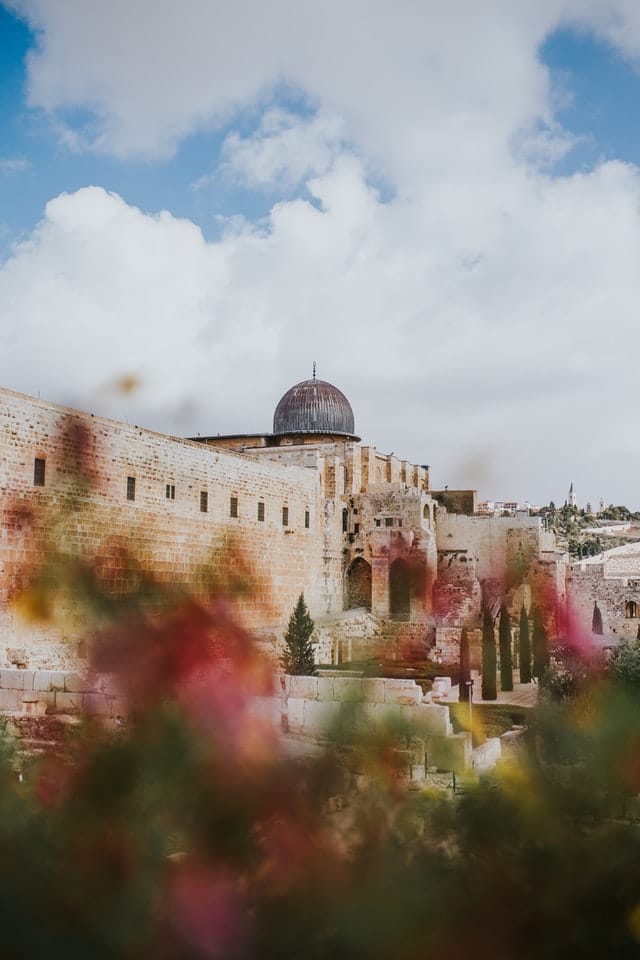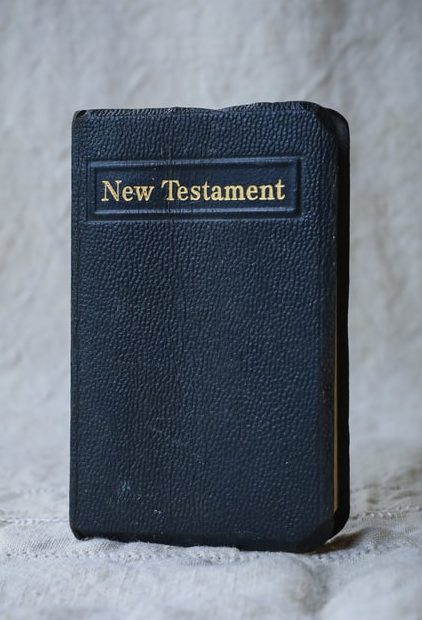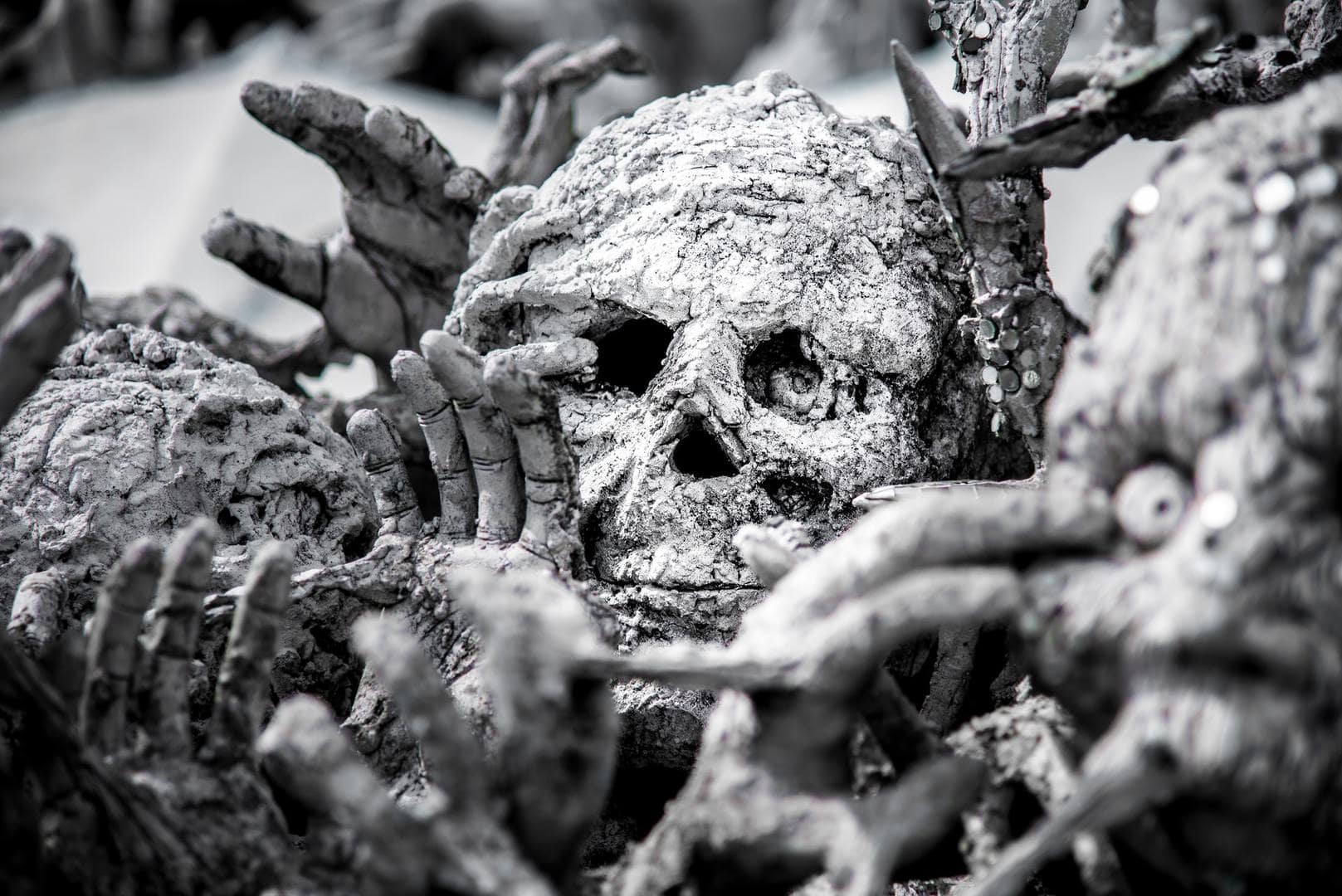




Exodus from Hell: Unlearning What You’ve Been Taught About Salvation
I do believe that the only hell that could possibly exist is the one of which those Christian contemplatives speak: the hatred within each of us that turns the love of others – of God and neighbor – into torment. It is entirely a state we impose upon ourselves. – David Bentley Hart, That All Shall Be Saved, 27.
[People] create their own hell and help one another descend into it. – René Girard, The Scapegoat, 134.
Does the thought of God sending people to an eternal conscious torment of hell bother you?
It bothers many of us. Think of it on a human level. If someone sent millions of people into ovens for them to be tortured, we would rightfully call that person evil. And history has called that person evil. This should make us rethink our understanding of hell. After all, if God is good in any sense of the word, God cannot be anything like Hitler. But many of us have been given a version of God that is like Hitler, only on steroids.
If you grew up with that view of hell, there is good news. That view of hell doesn’t exist in the Bible.
This (mis)understanding of hell often goes something like this: God loves you, but because God loves you He may send you to hell where you will experience eternal conscious torment. Why? Well, because you didn’t believe in Jesus. And this was all part of God’s plan. You see, thousands of years ago, two people did something really bad and you inherited their guilt. And while God is love, God is also wrath and will justifiably send you to eternal hell where you and the majority of humans will suffer forever and ever. Amen!
Yikes.
You may have questions about that version of god. Like, what about all those who were born before Jesus and those who have never even heard of Jesus? Was it really God’s plan to damn them to suffer for all eternity?
What about your friend who was born into another religion? Are you just lucky that you were born into a Christian family? Too bad for your friend, this reasoning goes, she should have the courage to convert.
And you are not so much lucky as you are elected. God chose to create billions of people, but only elected a select few to live with him in eternity in heaven. The rest of humanity will suffer forever.
That is not a God of love. It’s a God of manipulation. The ultimatum that we need to believe in God “or else you go to hell” is a form of spiritual abuse that we would do well to reject.
In fact, much of what we have been taught about hell comes from outside of the Bible. The phrase “eternal conscious torment” is taught to be the traditional view of hell. But did you know that the phrase “eternal conscious torment” is never used in the Bible? People who hold to this view tend to be those who claim to take the Bible literally, but why base an understanding of hell on a teaching that literally is not in the Bible?
This isn’t an abstract concept, of course. We all have personal experiences of people we love who don’t believe in God. Like my Grandfather who died as an atheist, many people who don’t believe in God are kind and generous. They are quick to help others in need. Are we to believe that a loving God would send them to eternal conscious torment because they didn’t believe in God? That doesn’t sound like a loving God. That sounds like a God who demands that we stroke the divine ego or else.
But what does the Bible actually teach about hell? Interestingly, the Bible uses multiple words that are frequently translated into the English word hell. According to the etymologist Robert Barnhart, the word “hell” first appeared in the year 725 CE and was gifted to Christians by Anglo-Saxon pagan. So even the word “hell” is not, strictly speaking, biblical. It’s actually pagan.
Our Descent
Let’s start with the first word – the Old Testament word Sheol.





The Old Testament – Sheol
If you thought that the Bible has one consistent teaching about what happens to us after we die, you would likely be surprised to discover what the Old Testament says. The word used in the Old Testament is Sheol. It is the place of the dead. Sheol is where everyone goes. It doesn’t matter if you believed the right way or not, if you were righteous or wicked. Sheol is not a place of reward or punishment. It is the place of the dead where everyone eventually goes.
The Psalms – Is God In Hell?
For example, Psalm 89:48 states, “What person can live and not see death? Can anyone deliver their soul from the power of Sheol?” Of course, the implied answer is “no.” Humans are mortal. We will all experience death and no one can escape the power of Sheol, the place of the dead.
But Psalm 23:4 adds something important to the concept of Sheol. “Even though I walk through the valley of the shadows of death, I will fear no evil, for you are with me; your rod and your staff, they comfort me.”
Sheol is not the “hell” that many of us grew up learning. We generally think of hell as the absence of God, but we’re also told that God is omnipresent, or everywhere. Which is it? According to Psalm 139, God is even in Sheol, “If I make my bed in Sheol, you are there.” If we insist that Sheol is hell, then we must insist that God is in hell, too, comforting us even when we are in hell.
Jacob, His Coat of Many Colors, and Sheol
Sheol is mentioned in a few other places in the Old Testament. Do you remember Jacob and his 12 sons in Genesis 37-50? Jacob, who wrestled with God and then his name was changed to Israel, had 12 sons. As if warning all parents, Jacob had a favorite son whose name was Joseph. Jacob gave Joseph a special coat of many colors.
The Bible knows that parents who play favorites create a special kind of hell for their family. Jacob’s favoritism for Joseph created envy among his sons. The 11 brothers united in their hatred against Joseph. The brothers decided to throw Joseph in a pit in the desert and leave him to die.
Joseph was in a pit deep in the earth. This is a hint early in the Bible that hell is a product of our own making.
The brothers saw a caravan of hairy Ishmaelites in the distance. They recognized them as slave traders. One brother suggested that instead of leaving Joseph to die, they sell him into slavery to the Ishmaelites.
After selling Joseph, the brothers decided to kill a lamb and pour its blood on Joseph’s precious coat. They took the coat back to Jacob and told their dad that Joseph was murdered.
Jacob grieved for his son. His daughters and his sons tried to console him, but he refused to be consoled. Jacob cried out, “Surely I will go down to Sheol in mourning for my son” (Genesis 37:35).
Jacob is one of the great patriarchs of the Bible. For many, the patriarchs are heroes who are clearly in heaven. But here Jacob doesn’t say he will go up to heaven, but he will go down to Sheol.
Sheol and David’s Revenge
Near the end of his life, King David wanted to give advice to his son Solomon, who would succeed him as the King. During his life, David spared many of his enemies, but as he lay on his deathbed in 1 Kings 2, he felt the desire for revenge.
One such enemy was named Shimei. David wanted Shimei to be punished for his betrayal of David and he invited Solomon to do his dirty work. “David said to Solomon, “Now therefore, do not let him (Shimei) go unpunished, for you are a wise man; and you will know what you ought to do to him, and you will bring his gray hair down to Sheol with blood.”
David makes a connection to Sheol that has tragically permeated our understanding of hell. Remember that Sheol is just a place of the dead – whether we’ve been good or bad, we all go to Sheol. But here David connects punishment and revenge with Sheol.
Notice that God is never portrayed as desiring this punishment or revenge against Shimei. David is as manipulative as a God who is love but will send us to eternal conscious torment if we don’t believe the right things. David manipulates Solomon by requesting this act of punishment while also connecting punishment with Solomon’s wisdom. David’s tragic connection of wisdom with violence plagues our human relationships as well as our understanding of God.
Job – What Happens to the Wicked in Sheol?
Poor Job. He had everything anyone could ever want, and then it was suddenly taken away from him. His servants were killed and his animals were stolen first by the Sabeans and then by the Chaldeans. Then his children as they were partying together with food and wine when a massive windstorm destroyed their house and the roof collapsed on them. Then he developed sores on his body that he could only scratch with broken bits of pottery. He has three friends who tell him that this was all his fault and that he sinned against God to deserve these things.
John-Paul Sartre once said, “Hell is other people.” Job’s friends exemplify that phrase.
By chapter 3, Job curses the day he was born and wishes he died at birth. Job says that in his death, “I would be lying down and quiet, I would be asleep; then I would be at rest with the kings and counselors of the earth…There the wicked cease from troubling and there the weary are at rest.”

Okay. There’s a lot going on in Job, but when it comes to Sheol and our concept of hell, did you notice that last part? We usually think of Sheol as hell – the place where the wicked go. But apparently everyone goes to Sheol and the wicked stop being wicked. Here the afterlife isn’t about punishing the wicked, but about ending the wicked ways of the wicked.
Jeremiah and the Valley of Hinnom
The word Jesus uses in the Gospels that usually is translated “hell” is the Greek word Gehenna. Gehenna is itself a translation from the Hebrew phrase, “the valley of Hinnom.” This phrase appears in Jeremiah 7, 19, 31, and 32.
The valley of Hinnom was a literal place here on earth. Jeremiah 7 states that “the people of Judah have done evil in my sight, says the Lord … they go on building the high places of Topheth, which is in the valley of the son of Hinnom, to burn their sons and their daughters in the fire-which I did not command, nor did it enter my mind.”
Interestingly, it is people who force other people to walk through fire in Gehenna. Gehenna, or, if we insist, “hell,” is created by humans to be a place of fire and death.
But it gets worse. Jeremiah says that since humans have created this hell, the days are coming when the people will have their corpses piled up in the valley of Hinnom. Their bodies “will be food for the birds of the air, and for the animals of the earth…” Jeremiah’s prophecy soon came true when the Babylonian empire came to Jerusalem, destroyed the city, killed many of the inhabitants, and their corpses were thrown into Gehenna where they were burned for birds and animals to eat.
We will return to this later when we discuss Jesus, but notice that Jeremiah’s prophecy about the valley of Hinnom came true within his generation. It was an event that didn’t take place after death, but during human history. Jeremiah was prophesying the destruction, violence, and suffering of the hell that humans so often put each other through.
But the key to understanding Jeremiah and the prophets is that destruction doesn’t have the last word. Restoration has the last word.
That is the pattern of the prophets. There is a time of punishment and destruction, but restoration is always promised. For example, after the destruction and suffering in Jeremiah 32 comes the restoration in Jeremiah 33. “I am going to bring it recovery and healing; I will heal them and reveal to them abundance of prosperity and security. I will restore the fortunes of Judah and the fortunes of Israel, and rebuild them as they were at first. I will cleanse them from all the guilt of their sin against me, and I will forgive all the guilt of their sin and rebellion against me” (33:6-8).
This pattern of punishment and restoration is key to our understanding of hell. Jeremiah was a major influence on Jesus’s understanding of hell, afterall, Jesus got the language of Gehenna from Jeremiah.
Daniel and the Intertestamental Period, AKA Second Temple Judaism – 450-ish BCE to 55-ish CE
Before we get to the New Testament, we need to say a brief word about the “Intertestamental Period.” This period mostly coincides with Second Temple Judaism, which takes place from Nehemia to the writings of the New Testament. It roughly spans from 450 BCE when Nehemiah helped rebuild the Temple (hence Second Temple Judaism) and the writings of the New Testament (Paul wrote his first letter around the year 55 CE). It’s roughly the time between when the last book of the Old Testament and the first writing of the New Testament.
There were actually a lot of Jewish writings during this period. Protestants call these books “apocryphal,” meaning they are false. Catholics are much nicer to many of the books written during this period, calling them “deuterocanonical,” or secondary to the canon of scripture.

The important point for us is that during this time, Jewish writing delved deeply into apocalyptic literature. And this apocalyptic literature had a big influence on the New Testament. Enoch, 2 Baruch, 4 Ezra, Daniel 7-12 were all written during this time. They have a deeply apocalyptic bent to them and were a major influence on the writings of the New Testament.
Apocalypse comes from a Greek word that literally means “unveiling” or “revealing.” Apocalyptic literature tries to open up the curtain between the physical realm and the divine realm to reveal something ultimately true about the way the universe works.
The apocalyptic literature written during this time tends to be very different from previous Jewish scripture in another way – apocalypse tends to emphasize wars, a battle between good and evil, and judgment.
Daniel is the latest book of the Old Testament. It’s thought to have been written around the year 164 BCE. Chapter 7-12 are the apocalyptic chapters. There is a battle between the king of the north and the king of the south. The kings grow in power through greed and war, but a pattern always emerges. Another king emerges to do battle. But here’s what is really interesting about apocalyptic wars – as the kings go to war and kill off one another in a hell of their own making, the people of God do not engage. They remain strictly nonviolent.
Daniel 11 states that a king shall enter Jerusalem. He will occupy the temple and desecrate it. The faithful of God do not just sit back passively. Rather, as Daniel says, “the people who are loyal to their God shall stand firm and take action. The wise among the people shall give understanding to many; for some days, however, they shall fall by the sword and flame, and suffer captivity and plunder. When they fall victim, they shall receive a little help, and many shall join them insincerely. Some of the wise shall fall, so that they may be refined, purified, and cleansed” (11:32-35).
Apocalyptic literature in the Bible is very violent. But it’s important to point out that the main apocalyptic books in the Bible, Daniel and Revelation, both claim that the people of God are to remain nonviolent. Nonviolence is the biblical apocalyptic ethic. The people of God are to remain nonviolent, even at the point of death. Notice that the wise ones do take action, but their action is nonviolent – their action is to teach. And if they fall by the sword or by the flames of fire, it is for their refinement, purification, and cleansing.
And here we find one of our first clues about the fires of hell. Fire is for purification. As we will soon see, the New Testament frequently speaks of fire just like Daniel does, not primarily as a punishment, but as an agent of purification.
Daniel has another clue for us when it comes to apocalyptic judgement. In Daniel 12:2, we get the first judgment seen in the Bible. It says this, “Many of those who sleep in the dust of the earth shall awake, some to everlasting life, and some to shame and everlasting contempt.”
There are a few things to notice here. First, it says “Many of those who sleep in the dust…” Why many? Isn’t everyone supposed to be judged? What happens to the others who aren’t included in the “many”? Do they just sleep for eternity? Do they get judged later?
The other important thing to know about this passage is that the Hebrew word olam. It usually is translated as “everlasting,” but it doesn’t mean forever and ever. Olam actually has stronger connotations of meaning “long duration.”
This is important because the Bible speaks in periods of time, or ages. Daniel continues the pattern of the prophets before him. Apocalyptic judgment follows the same pattern. There may be judgment and even punishment now, but judgment and punishment don’t have the last word. Restoration has the last word.
A close reading of Daniel 12 leads to another interesting observation. We tend to think that waking up to shame and contempt is only a bad thing. But what if it’s really a good thing? Spiritual growth might only happen when we wake up to the ways we have fallen short. In this case, judgment is the process of waking up to the ways we have participated in systems and principalities that lead to injustice and harm. Realizing this can bring a deep sense of self-shame and self-contempt. But again, those emotions don’t have the last word. For God is always calling us beyond our shame and contempt toward healing, wholeness, and forgiveness. It’s a long process that might take forever, precisely because it’s a process of coming to terms with our past and developing empathy for those we’ve harmed and for those who have harmed us.

New Testament
We typically think of heaven and hell as realities that we encounter primarily after we die. But Jesus thought differently.
In Luke 17, Jesus says that the kingdom of God is among you. The kingdom of God is the heavenly realm where God lives. But it’s not somewhere high up in the sky, waiting for the chosen to arrive after they die. Rather, the heavenly realm is already here. It’s a way of life that he brings to us – a way of healing the sick, feeding the hungry, welcoming the strangers, helping the poor, and loving our neighbors, including those that we call our enemies.
But the alternative is also true. Just as we saw in Jeremiah that the hell of Gehenna is a literal place here on earth of death and violence, so is hell a way of life here on earth. Gehenna is primarily found within our relationships.
When Jesus says that the most important commandment includes loving our neighbors as we love ourselves, he is telling us how to live into the realm of heaven here on earth. But we can also choose to live into hell here on earth. Jesus’ warnings about hell are primarily about the destruction that we can cause one another here on earth.
Jesus provides many warnings about Gehenna. He uses the term over 70 times. But just as Jeremiah used Gehenna to warn his contemporaries about impending disaster, Jesus used Gehenna in the same way. Let’s go over some examples.
Jesus’ Teachings on Hell
First, in his teachings Jesus related Gehenna to our relationships. In Matthew 5:29-30, Jesus states,
If your right eye causes you to sin, tear it out and throw it away; it is better for you to lose one of your members than for your whole body to be thrown into Gehenna. And if your right hand causes you to sin, cut it off and throw it away; it is better for you to lose one of your members than for your whole body to go into Gehenna.
Fortunately, biblical literalists don’t actually take the Bible literally. We don’t see many of them walking around without a right eye or a right hand. Whatever sin Jesus is talking about in this passage, even literalists know that he is using hyperbolic language to make a point. What Jesus provides throughout Matthew 5 is practical wisdom for life. If some behavior in your life causes you to harm your relationship with others or with God, cut it out of your life. Why? Because it is causing you a life of hell right now. It is better to cut that thing out of your life than for you to experience your whole existence being thrown into hell now.
There’s another interesting thing about this passage. Who will throw your “whole body” into Gehenna? You might think God does that, but notice that Jesus doesn’t say that. We have been trained to add God into these kinds of passages where God isn’t there. So, who will throw your body into Gehenna? Thinking back to Jeremiah, it was humans who threw dead bodies into Gehenna. So, it could be that if we live our lives sinning against one another, eventually someone will throw us into a hell here on earth. Or it could be that we throw ourselves into hell. The point is, as in so many places when we encounter Jesus’ words about hell, he leaves the active agent mysteriously out of the scenario. The job is for us to take the responsibility to interpret these passages. If we have a violent image of God who throws individuals into hell, we will project God into these passages. If we see hell as a making of our own destructive habits, we will see that we throw one another and ourselves into hell.
Jesus’ Parables on Hell
The parables are notoriously difficult to understand. In fact, Jesus alludes to this in Matthew 13 when his disciples ask him why he spoke in parables. Jesus responded, “To you it has been given to know the secrets of the kingdom of heaven, but to them it has not been given.”
If you are like me, you really want to know what the secret is that will unlock the mystery of the parables. There are times Jesus explains individual parables, but he never gives us the specific key that unlocks all the parables.
But we do know the key. From the very beginning of Christian history, the key revelation was found on the cross. The cross is the greatest parable that is our interpretive key for all parables. On the cross, we find the mystery of the kingdom of heaven unlocked. Jesus, the one who Christianity claims is God with us, was thrown by his fellow humans into the hell of outer darkness where he wept and gnashed his teeth.

But that’s not the end of the story because hell and violence do not have the last word. The end of the parable is Resurrection. Jesus says that he is the fulfillment of the law and the prophets. Remember, it is the prophets who first revealed this pattern – there is violence and destruction, but then there is restoration. Jesus and the cross reveal that the violence and destruction always come from humans. As Peter says in his first sermon in Acts, God offered Jesus to us. Humans crucified him, but then God brought him back to life. We have often been taught that it was God who sent Jesus to the cross. But that’s not what the Gospels or the book of Acts say. They say that humans sent Jesus to the hell that was the cross. Then God gave his life back to him in the resurrection.
In his resurrection, we might expect Jesus to come back for revenge against those who killed him. Afterall, isn’t that what justice requires? But in the resurrection, Jesus doesn’t seek revenge. In fact, he offers the spirit of forgiveness to his disciples and he invites them to share that forgiveness with others. At no point does the Jesus of the Gospels instruct his disciples to return violence for violence and at no point does Jesus himself return violence for violence. At every point, from his birth to his death to his resurrection, Jesus stops the cycle of violence, the cycle of hell, and he offers peace and forgiveness in return. (For more on the Atonement, download my free ebook here.)
With the parable of the cross as the ultimate key for understanding the parables, let’s explore a few parables.
The Parables
The Parable of the Wedding Banquet
In Matthew 22:1-12, Jesus tells the parable of the wedding banquet. He starts with a familiar phrase in his parables, “The kingdom of heaven may be compared to a king who gave a wedding banquet for his son.”
We have been trained to see the king in these parables as God. But Jesus never explicitly makes that connection in the parables. The king might be God, or the king might be a stand in for how literal kings act. As the parable continues, we should have this question in mind – does the king in this parable represent the God revealed in the cross and resurrection of Jesus?
The king invites many of his subjects to the party, but they all make excuses for not being able to attend. They even “made light of it and went away, one to his farm, another to his business, while the rest seized his slaves, mistreated them, and killed them.”
Ouch!
The guests were cruel and violent murderers. But how would you expect the God of the cross and resurrection to respond? Well, Jesus didn’t pray for revenge while he hung on the cross. Instead, he offered forgiveness, “Father forgive them, for they know not what they do” (Luke 23:24). And then in the resurrection, he offered that spirit of forgiveness to his disciples and invited them to share it.
But in this parable, the king acts very differently. Instead of offering forgiveness, he seeks revenge. “The king was enraged. He sent his troops, destroyed those murderers, and burned their city.”
Does the king of this parable sound like the God of Jesus, who teaches us to turn the other cheek? Who says that “those who live by the sword will die by the sword”? Or who tells us to love even those we call our enemies and pray for those who persecute us?
No. This king doesn’t sound like the God of Jesus at all. In fact, it sounds like your typical earthly king who kills his enemies but does good to those who obey his rules.
As the story continues, the king gathers people in the street to join him at the party. As the king looked around at his new guests, he found a man who wasn’t wearing a wedding robe. The king said, “Friend, how did you get in here without a wedding robe?” The man was speechless.
At this point, you might expect the king to say, “It’s okay. I understand. I mean, you’ve probably never been to one of these wedding banquets before, and I know how difficult it is to know what to wear. I have a bunch of robes lying around. Here, take this one.” Or, the king could at least say, “Go back home and put on a decent looking robe.”
But that’s not what the king said. Instead, he responded by instructing his attendants to, “Bind him hand and foot, and throw him into the outer darkness, where there will be weeping and gnashing of teeth.”
All because the man had poor fashion sense?
In any other circumstance, you would know that a king who treated people like that was acting like a morally unjust monster. The king of this parable, just like the king of most parables, is not the God of Jesus Christ.
But who is the God figure in the parable? The man in the parable who doesn’t wear the right clothing doesn’t play by the rules of the status quo. Rather, just like Jesus, he shakes up the status quo. And just like Jesus is silent in front of Pilate when Pilate asks him questions, the man in this parable is silent when confronted by the king. The man in the parable is sent by the king into the realm of “outer darkness, where there will be weeping and gnashing of teeth.” At the end of his life, Jesus is sent by King Herod and Pilate to the cross, the place outside the city where Jesus wept and gnashed his teeth as he suffered to his death.
If there is a God figure in these parables, it is not the king who throws people into hell. God is precisely the one who is thrown into hell.
The Rich Man and Lazarus

In Luke 16:19-31 Jesus tells a story about a rich man who had everything. He dressed in purple robes and fine linen, which was a sign of royalty during that time. Every day he feasted on the finest foods.
But just outside the gates of his mansion lived a poor homeless man named Lazarus. Lazarus would have loved to merely eat the crumbs that fell from the rich man’s table. He suffered from hunger and his body was covered in sores.
The two men eventually die. The story says the rich man was “In Hades, where he was tormented, he looked up and saw Abraham far away with Lazarus by his side.”
The rich man calls out to Abraham to have mercy on him, and begs that Lazarus “dip the tip of his finger in water and cool my tongue; for I am in agony in these flames.”
Abraham responds to the rich man’s request with a similar callousness that the rich man showed to Lazarus. “Child, remember that during your lifetime you received your good things and Lazarus in like manner evil things, but now he is comforted here, and you are in agony.”
We often interpret this parable in a callous way that lets us off the hook. It’s easy to make this story about two people who lived 2,000 years ago. But the story of the rich man and Lazarus isn’t about two people who lived long ago. It’s a story about us. It’s easy to blame the rich man, but let’s face it, any of us who has stable housing, food security, and a computer might be the rich man in this parable.
For Jesus, the point of the parable is that how we treat the poor matters. We often blame the poor by accusing them of being lazy and demand that they, “Get a job!” Or, like Lazarus, we may find any number of reasons to ignore them. Sometimes solving the problem of poverty and houseleness can feel so overwhelming that we quit before we even try. Or we start and quickly discover that there are all kinds of social and political forces that block any meaningful solution. Tragically, we often find Christians standing in the way, demanding that houseless folks don’t deserve help because they would just squander it. Just like Lazarus, we can come up with all kinds of excuses to not help those in need.
All of this leads to more hell on earth. As Jesus continues the parable, he tells of a great reversal. Lazarus is now by Abraham’s side (or other translations say Abraham’s “bosom,” which is a code word for heaven) and the rich man is in Hades. The rich man is now the new Lazarus and Lazarus is now the rich man. Like Lazarus before him, the rich man now begs for help, but Abraham refuses, saying, “between you and us a great chasm has been fixed, so that those who might want to pass from here to you cannot do so, and no one can cross from there to us.”
One of the really interesting things about this parable is that God is entirely absent. Jesus never mentions God. Abraham says that there is a great chasm that makes it impossible for anyone to pass from Abraham’s bosom to the rich man in Hades, but who created that chasm? The story doesn’t say. Did God create the chasm? Did Abraham create the chasm?
And was Abraham correct that it is impossible to cross that chasm, or was it only “impossible” because it would have caused some discomfort for Abraham? Is Abraham acting just as callous as the rich man? After all, if you read Genesis, you will discover that Abraham had some questionable characteristics himself. Abraham had multiple wives. He acted callously like the rich man when he abandoned his wife Hagar and his son Ishmael to the desert.
Abraham also put his wife Sarah at risk while they traveled throughout the middle east by claiming that she was only his sister. Abraham feared that the kings would kill him because they would want Sarah as one of their wives. After saying that Sarah was only his sister in Genesis 20, the king of Gerar took Sarah alone into his palace. Fortunately, God intervened to protect Sarah, but Abraham’s callousness toward Hagar, his son Ishmael, and Sarah were on full display, just like the rich man’s callousness toward Lazarus.
And I think we have more reasons to be suspicious of Abraham. Jesus two chapters later in Luke 18, Jesus talks to an actual rich man who was a ruler of the people. The ruler asked Jesus, “Good Teacher, what must I do to inherit eternal life?” Jesus responds by telling him to follow the ethical commands in the 10 Commandments – do not commit adultery or steal or murder or bear false witness, and honor your father and mother. The ruler stated that he followed all of those rules. Jesus replied, “There is one thing lacking. Sell all that you own and distribute the money to the poor, and you will have treasure in heaven; then come follow me.”
The rich ruler hated that answer. After hearing Jesus’ advice, “he became very sad; for he was very rich.” Jesus then says these famous words, “Indeed, it is easier for a camel to go through the eye of a needle than for someone who is rich to enter the kingdom of God.”
Those who heard Jesus say this asked him, “Then who can be saved?” After all, we often assume that riches are a sign of God’s blessing. If it’s impossible for rich people who are blessed to enter the Kingdom, then who can be saved?
While God is entirely absent in the parable of the rich man and Lazarus, God is not absent in the story of the rich ruler. Jesus responds, “What is impossible for mortals is possible for God.”
Why was it impossible for Abraham to cross the chasm to the rich man? Maybe because Abraham was mortal. But what is impossible for mortals is possible for God. In fact, part of the story of Christianity is precisely that God in Christ did what according to Abraham was impossible – Jesus crossed the chasm of death and hell by going to the cross and defeated those powers that separate us. The point is that with God, the chasms between heaven and hell here on earth that seem impossible to bridge can be bridged now, because they have already been bridged by Jesus. In fact, Jesus went to hell on the cross in order to bridge the chasm and set the captives free.
The Parable of the Sheep and Goats
Those who point to hell as a place of eternal conscious torment often look to the parable of the Sheep and the Goats in Matthew 25:31-46.
Even though the phrase “eternal conscious torment” is never used in the Bible, Matthew 25 is the only passage anyone can use to argue for such a horrific view. The passage is fraught with translation difficulties.
It starts like this:
When the Son of Man comes in his glory, and all the angels with him, then he will sit on the throne of his glory. All the nations will be gathered before him, and he will separate people from another as a shepherd separates the sheep from the goats.
The difficulties with translation come in the second sentence. This judgment scene starts with All the *nations* being gathered before the Son of Man. As Brian Zahnd tells us in his book A Farewell to Mars, the term nations is not about individuals. It’s about nations, or political entities. The nations will be judged.

Unfortunately, most translators do not like this because translations muddy thewaters by using the word “people” in the second part of that sentence. The original Greek word is not people. It is simply them. Notice the difference between the following sentences:
All the nations will be gathered before him, and he will separate people from another…
And then –
All the nations will be gathered before him, and he will separate them from another…
That one word makes a huge difference! The Greek word is “autous.” That word is never translated as “people.” It means “they,” “them,” or “their” depending on context.
When translators use the word “people” instead of “them” it allows us to think this final judgment is about individuals, not about national systems. I am fine with a final judgment on individuals (we will talk about that later), but that is not what Jesus talked about in this parable.
Saying this judgment is about people is a convenient way to neglect the fact that God judges political systems. The prophets judged national systems when they refused to care for the poor and vulnerable. For example, Isaiah chapter 10 proclaims, “Ah, you who make iniquitous decrees, who write oppressive statutes, to turn aside the needy from justice and to rob the poor of my people of their right.” The prophet Jonah confronted the capital city of the Babylonian Empire, Nineveh, on its wicked ways. Everyone in Nineveh, even the king, repented.
The criteria of the final judgment according to Jesus is not whether the nations believed in him. It’s whether the nations had systems that cared for the poor, the hungry, the thirsty, the stranger, whether they visited people in prison.
The nations who cared for such people are the sheep, and are sent “to eternal life,” but the nations who didn’t care for those in need are the goats who are sent “into eternal punishment.”
These phrases bring up another difficulty in translation. First, the word translated as eternal in Greek is “aionios.” It can mean eternal, but it carries with it the sense of an eon, or “a long period of time.”
The other problem with translating this passage is the word “punishment.” The word in Greek is kolasin. It is usually translated as “chastise.” There’s another Greek word for punishment, which is timoreitai.
An ancient and orthodox theologian named Clement of Alexandria explains the difference between kolasin and timoreitai. He wrote “God does not punish [timoreitai] – because punishment is retribution of evil with evil – but chastises [kolazei] to help those who are chastised” (See A Larger Hope? By Ilaria Ramelli, pg 29).
The nations who are goats are not sent to eternal conscious torment where they are punished and suffer forever and ever. No, they are sent to a period of time of chastisement, where they get help to restore their original intention – to live lives of love, especially love for the “least of these.”

Is God the Annihilator? Jesus and Annihilationism
There is a third alternative to understanding hell called “annihilationism.” Some use a much nicer term called “conditionalism.” Basically, this view says that God will annihilate the body and soul of the wicked in hell, so that they don’t burn forever and ever, but God’s justice will be accomplished in their destruction. Some use the term “conditionalism” to say that human existence is conditional upon the desire of God. Instead of God annihilating these people, God removes life from them, thus they no longer have any existence.
The primary text for this is Matthew 10:28. Jesus warns his disciples, “Do not fear those who kill the body but cannot kill the soul; rather fear him who can destroy both soul and body in Gehenna.”
There is Old Testament evidence for this view, too. Psalm 92 states, “…though the wicked sprout like grass and all evildoers flourish, they are doomed to destruction forever, but you, O Lord, are on high forever. For your enemies, O Lord, for your enemies shall perish; all evildoers shall be scattered.”
The prophet Malachi also gave a dire warning, “See the day is coming, burning like an oven, when all the arrogant and all evildoers will be stubble; the day that comes shall burn them up, says the Lord of hosts, so that it will leave them neither root nor branch.”
There are a few interesting questions to ask about these violent verses. First, who is the one who destroys? We are trained to automatically think the answer is God. But notice that God is never explicitly stated as the actor in these verses. Even in the Matthew passage, Jesus never says, “Fear God who can kill both body and soul…”
Neither is God the actor of destruction in the Psalm or Malachi passages. Who is the destroyer? Some think it’s God. Others think it might be Satan. It could be that we destroy ourselves with our own violent destruction. The point is that the passages are often ambiguous.
Strangely, as Matthew 10 continues, Jesus immediately gives comfort to his listeners and tells them that God cares for them more than the birds of the air. God cares so much that God has counted every hair on their head. “So do not be afraid,” says Jesus, “you are of more value than many sparrows.”
Personally, I think the annihilationist view is a plausible outcome from a faithful reading of scripture. But I am not an annihilationist. I think the vast majority of scripture points to the annihilation of those aspects that block us from loving God and loving our neighbor as we love ourselves. Whatever wickedness or sin is in our bodies and souls that needs to be destroyed will be in an all consuming fire, but we will not be annihilated. The fire is not for annihilation, but for purification, as we will see below.
Acts of the Apostles – Where is Hell? What is Apocatastasis?
We need to say a brief word about the book of Acts. This book recounts the earliest preaching after the resurrection of Jesus. There are many sermons in this book and they are the first sermons ever preached by followers of Christ.
If you want to know what was important to the first followers of Christ, it’s essential to read Acts of the Apostles. But the same is true if you want to know what wasn’t essential.
Read through the Acts of the Apostles and you will never find any mention of hell. Gehenna is never mentioned by the first Christian preachers. If hell has always been such an essential element of the Christian faith, why didn’t the first Christians preach about it? Because for them belief in hell wasn’t essential.

The book of Acts does refer to the “apocatastasis,” or the “universal restoration” in 3:21. Peter delivers a sermon when he states, “Repent therefore, and turn to God so that your sins may be wiped out, so that times of refreshing may come from the presence of the Lord, and that he may send the Messiah appointed for you, that is, Jesus, who must remain in heaven until the time of universal restoration that God announced long ago through the prophets.”
This is an odd statement. None of the prophets explicitly announced universal restoration by using the phrase, but we can find hints of what Peter was referring to. For example, Isaiah 19:24-25 states, “On that day Israel will be the third with Egypt and Assyria, a blessing in the midst of the earth, whom the Lord of hosts has blessed, saying, ‘Blessed be Egypt my people, and Assyria the work of my hands, and Israel, my heritage.’”
To fully grasp how remarkable this vision is, we need to remember that “Egypt” is a major bad guy of the Old Testament. After all, it was Egypt who enslaved the Hebrew people for generations. The Egyptians didn’t believe in God and they were enemies of God’s people. The same is true of the Assyrians, who destroyed Israel and enslaved the people, spreading them throughout the Assyrian exile. It is because of the Assyrian Empire that the tribes of Israel were forever lost to history.
And yet Isaiah 19 reveals the prophetic cycle of punishment and restoration. Egyptian violence eats itself, as the Egyptian people destroy one another, but by the end of the chapter, Isaiah proclaims that some day in the future, Egypt and Assyria will share in the great blessings of God, for even they are God’s people and the work of God’s hands.
Isaiah 25:6-10 gives an even more profound vision of the universal restoration:
On this mountain the Lord of hosts will make for all peoples
a feast of rich food, a feast of well-matured wines,
of rich food willed with marrow, of well-matured wines strained clear.
And he will destroy on this mountain
the shroud that is cast over all peoples,
the sheet that is spread over all nations;
he will swallow up death forever.
Then the Lord God will wipe away the tears from all faces,
and the disgrace of his people he will take away from all the earth,
for the Lord has spoken.
It will be said on that day,
Lo, this is our God; we have wanted for him, so that he might save us.
This is the Lord for whom we have waited;
let us be glad and rejoice in his salvation.
For the hand of the Lord will rest on this mountain.
Isaiah prophesies the day when those who were enemies are restored on God’s holy mountain, where the shroud that blinded us to seeing our shared humanity will be destroyed and we will all rejoice in God’s salvation for, as Isaiah put it in the beginning of this passage, “all peoples.”
Paul, Eternal Destruction, Redemptive Fire, and the Eschaton
Just like in Acts of the Apostles, Paul never mentions the word Gehenna or other words for hell in his letters. He does refer to “eternal destruction” in 2 Thessalonians 1:9. Modern scholars debate whether Paul wrote 2 Thessalonians, in part because its style and tone is very different from 1 Thessalonians. 2 Thessalonians is cold and gloomy, while 1 Thessalonians is warm and hopeful.
Whether Paul wrote it or not, 2 Thessalonians is in the Bible. The key question is “What does ‘eternal destruction” mean?
As we have seen, the Greek word for “eternal” means “an age.” There will be an age of destruction, but what happens after that age?
Paul gives us some clues in 1 Corinthians chapter 3:11-15. He writes:
For no one can lay any foundation other than the one that has been laid; that foundation is Jesus Christ. Now if anyone builds on the foundation with gold, silver, precious stones, wood, hay, straw–the work of each builder will become visible, for the Day will disclose it, because it will be revealed with fire, and the fire will test what sort of work each has done. If what has been built on the foundation survives, the builder will receive a reward. If the work is burned, the builder will suffer loss; the builder will be saved, but only as through fire.
Well, which is it? Are certain people going to suffer “eternal destruction” or will we each walk through the fire and will some of us suffer loss as our work that is unsuitable for heaven will be destroyed in the fire?
Both 2 Thessalonians 1 and 1 Corinthians 3 are true at the same time. Paul is saying that we will suffer destruction for an age as we all walk through the fire. But the fire that destroys is not for the sake of punishment. It is for the sake of redemption and healing. Everyone will go through the fire, and everyone will survive the fire, but during the process our works that are not worthy of heaven will be destroyed. What will survive is our truest nature, the image of God that resides in all of us.
In Romans, Paul’s most important letter, he goes even further. In chapter 5, Paul compares the sin and death for all people, which he says was introduced into the world through Adam, to the justification of all through Christ. “Therefore, just as one man’s trespass led to condemnation for all, so one man’s act of righteousness leads to justification for all. For just as by the one man’s disobedience the many were made sinners, so by the one man’s obedience the many will be made righteous.”
Paul then talks about the eschaton, or the events of the last things, in 1 Corinthians 15. “Since death came through a human being, the resurrection of the dead has also come through a human being; for as all die in Adam, so all will be made alive in Christ.”
Paul’s language is universal. “…all die in Adam, so all will be made alive in Christ.” Paul is not merely talking about the elect, or about believers, he is talking about the entire human race being made fully alive in Christ. To be made fully alive is to be partakers in the life of God, who is Life itself. As Paul says in verse 1 Corinthians 15:28, in the end of all things, Christ has done all of this work so that God may be “all in all.” In other words, all will be in God and God will be in all.
Paul goes even further in 2 Corinthians 5:19, “…in Christ God was reconciling the world to himself, not counting their tresspasses against them, and entrusting the message of reconciliation to us.” The word for “world” here is “cosmos.” It usually gets translated as world, but it can mean “people.” It can also refer to all of creation. In a sense, to say that God is saving all people is even too small a statement. For God’s plan of salvation extends to all of creation. God is accomplishing this plan through the work of Christ. But this does not mean that we are free to sit back while God does all the work. Paul urges us to participate in the reconciliation of the cosmos now.

The Book of Revelation
No reflection on hell can be complete without discussing the Book of Revelation. First, this book is weird. The early church knew it was open to misinterpretation, which is why it was one of the last books to be accepted in the canon. I believe it is more akin to historical fiction that tells us something true about the world than it is about literal events that will happen in the future. The book is more political commentary that claims Jesus is Lord and so Caesar is not.
Just like the book of Daniel that we discussed above, Revelation talks about the kings of the earth. In the later chapters of Revelation, the king of the north and the king of the south are at war. They destroy one another. And just like in Daniel, the people of God are given a clear command of nonviolence, “Let anyone who has an ear listen: If you are to be taken captive, into captivity you go; if you kill with the sword, with the sword you must be killed. Here is a call for the endurance and faith of the saints.”
While the world seems to be falling apart because the kings and their armies destroy one another, the call for the followers of Christ is to remain nonviolent.
In fact, throughout the book of Revelation, the kings are seen as the major problem. In chapter 18, Revelation states that the Babylonian Empire has finally fallen. Most scholars think “Babylon” is code for the Roman Empire, but it could be a stand-in for any Empire that rises and will eventually fall. Verse 3 states, “… and the kings of the earth have committed fornication with her…”
In Revelation, fornication is not good. In fact, according to Revelation 21:8, there are people who won’t enter the new heaven and new earth. Clearly, the kings of the earth will not be allowed into salvation, as the verse claims, “But as for the cowardly, the faithless, the polluted, the murderers, the fornicators, the sorcerers, the idolaters, and all liars, their place will be in the lake that burns with fire and sulfur, which is the second death.”
Obviously the kings of the earth will never enter into the new heaven and new earth. The kings may not have been cowardly, but they were faithless, polluted murderers who fornicated with Babylon (and many women) who often called upon sorcerers and committed idolatry as they lied to one another and their subjects. If anyone fit the description of Revelation 21:8 and deserved to be in the lake of fire that burns forever and ever, it is the kings of the earth.
But Revelation then throws us a curveball. Revelation 21:24 states that in the new heaven and new earth, “the nations will walk by its light, and the kings of the earth will bring their glory into it.”
But how could it be that the kings of the earth bring their glory into heaven? Especially when just a few verses later, Revelation says, “But nothing unclean will enter it, nor anyone who practices abomination or falsehood, but only those who are written in the Lamb’s book of life” (21:27).
According to Revelation, the kings of the earth are the most unclean people. They practice abominations and falsehoods. They were not the saints. If anything they were the anti-saints. And yet they enter the new Jerusalem. How could that be?
Taking the New Testament as a whole, we can affirm that the king of the earth went through the fire of Revelation 21:8. As Paul states in 1 Corinthians, the fire burns away the wood and the hay, metaphors for bad works inside of us all, leaving only the glory of the precious gold and silver each of us possess. And when all of that was burned up in Revelation 21:8, the kings of the earth were able to enter into the new heaven and the new earth with all of their glory in Revelation 21:24.
And so who is written in the “Lamb’s book of life”? Everyone, including the faithless, polluted, murderous kings who practiced fornication and called upon sorcerers to commit idolatry as they lied. Yes, even they will have all of their sins burned away before they bring their glory into the new heaven and the new earth.
The Free Will Argument
There is one more argument about heaven and hell that we need to discuss. Many claim that God gives us free will, and that freedom includes the ability to reject God forever and ever. God would never force someone into heaven if that person freely chose to not enter the heavenly gates.
But there’s a problem with the free will argument. I’ll put it this way: Imagine someone is face to face before God. God says to this person, “I’ll give you the choice – behind door number 1 you can live with me in eternal joyful bliss, or behind door number 2 you can choose to suffer in eternal conscious torment where you will scream in agonizing torture for all eternity. Which option do you choose?”
Is the person who chooses door number 2 really free? I would say absolutely not. That person is enslaved to irrational faculties. No one who is truly free would ever choose to suffer the worst toruture imaginable for all eternity.
But what if we take out” eternal conscious torment” from the equation? Maybe this person just freely chooses to reject God and be eternally separated from the divine presence.
I am convinced that the reason anyone rejects God is because we don’t know God fully as the source of Love and Life. Instead, we have all been told contradictory messages about God, some of those messages we should rightly reject. After all, a god who sends people to eternal conscious torment should be rejected. But when we come face to face with God, we will know God for who God really is. As Paul wrote in 1 Corinthians 13:12, “For now we see in a mirror, dimly, but then we will see face to face. Now I know only in part; then I will know fully, even as I have been fully known.”
1 John 4:16 states that God is love, but none of us can fully understand the God who is love. Some of us have been told and shown by others the lie that God is not love, that God actually hates. But when we come face to face with the truth about God’s love, no one who is truly free would ever say “No” to God.
Conclusion: The Scandal of Universal Salvation
The best argument for an eternal conscious torment of hell is summed up in one name – Adolf Hitler. But there are many less well known names – those people who have traumatized us with physical and spiritual violence without any remorse. Does justice require God to punish them for eternity with torment? Or is infinitely punishing someone for finite crimes (even the most horrendous) not really justice, but merely revenge?
This is the most difficult part of the hell conversation. As a pastor, I’ve been told horrific stories about how people have suffered harm. Sometimes they ask, “Do I have to see that person in heaven?”
It may take eons for such people consumed with evil to have that evil painfully purged from their souls. It may feel like torture. But if God is reconciling the Cosmos to God’s Self, then I have to think this includes even them. Does that mean we must see our persecutors in heaven?
The honest answer is that I don’t know. Jesus says there are many rooms in his Father’s house. Maybe those rooms separate us from those who caused us harm. Or maybe God’s purifying love will heal our hurts and we will see that even underneath the most evil and vile human person is the image of God.

Suggested Reading
Razing Hell: Rethinking Everything You’ve Been Taught about God’s Wrath and Judgment, by Sharon Baker
That All Shall Be Saved, by David Bentley Hart
All Set Free: How God is Revealed in Jesus and Why That is Really Good News, by Matthew Distefano
Hellrazed?, Edited by Kevin Miller
Hellbound? Directed by Kevin Miller
A Larger Hope? (Volumes 1 and 2), but Ilaria Ramelli
The Rapture Exposed: The Message of Hope in the Book of Revelation, by Barbara Rossing
